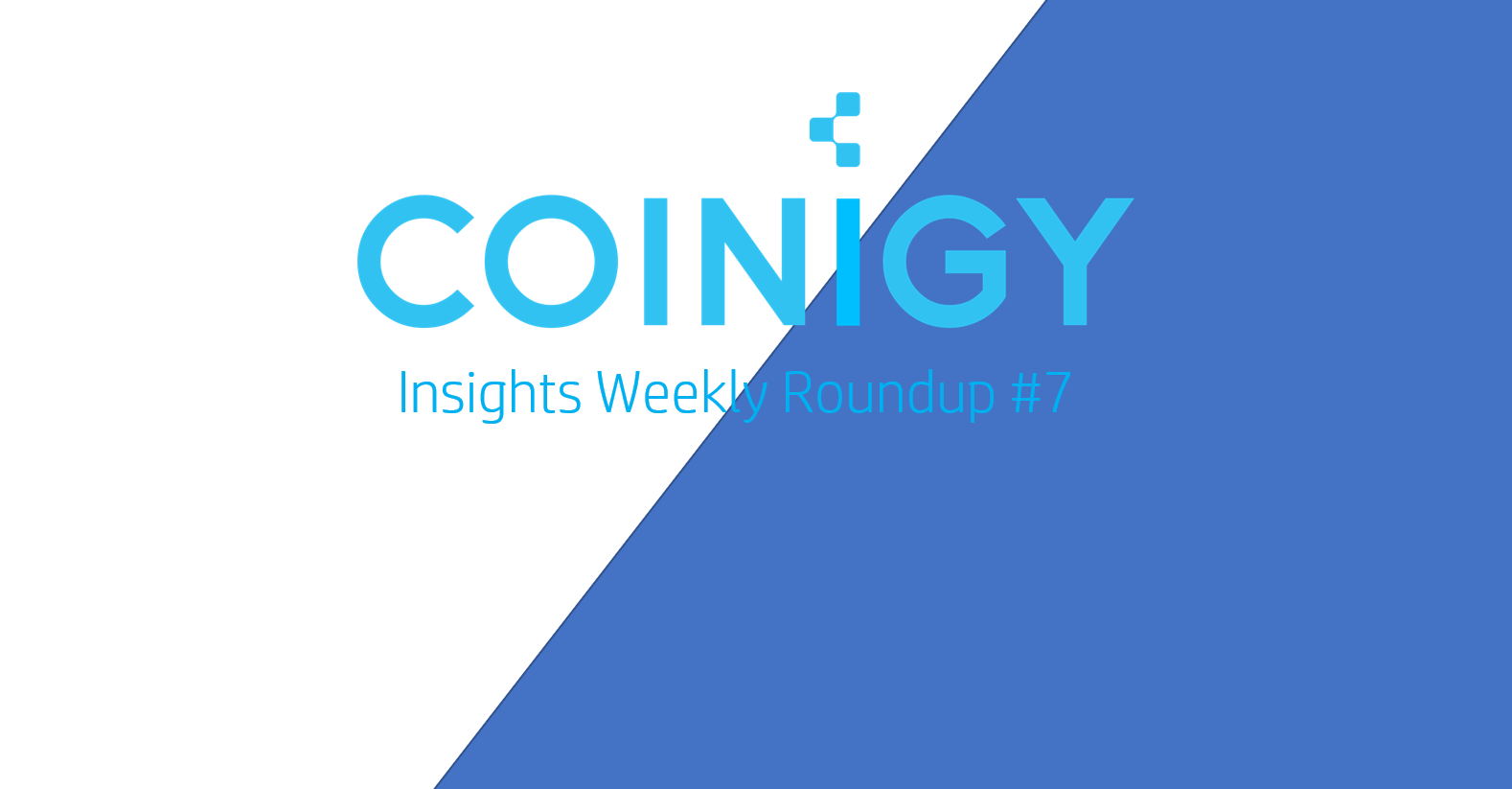Coinigy Insights Weekly Roundup #7

Presenting the Insights team's Weekly Roundup #7! Apart from the original research pieces the Insights team works on, the Roundup series aims to highlight key pieces of work from the community as a whole. Along with this, we briefly describe key industry news developments that took place during the past week that community members may have missed. If you have any questions or think we missed something important, feel free to let us know!
Research and Insights
2nd Global Cryptoasset Benchmarking Study by University of Cambridge's Centre for Alternative Finance
- Cambridge's Centre for Alternative Finance has been a major resource in the digital currency space for years now. In their second foundational report on cryptoassets, the Centre takes in an immense about of both public and private survey data to report on the cryptoasset industry. For anybody actively involved or interested in the space, this report is essential.
- Disclaimer: Coinigy was one of the many survey respondent organizations in this study.
The State of Bitcoin: Long-Term Value Potential & Analysis by Delphi Digital
- Delphi Digital releases their extensive report on the value proposition of Bitcoin. While much of the content may not be necessarily new to many active community members, Delphi does a solid job at laying down the advantages and opportunities that Bitcoin has moving into the future. Some key takeaways as noted by Delphi include:
- In the short-term, prices may continue to be suppressed but the team doesn't expect this last beyond Q1 2019.
- The Lightning Network has grown swiftly and efficiently. As such, given its goal, it is a key component for Bitcoin scaling into the future.
- Bitcoin has several value drivers including censorship-resistance (for offshore banking), portfolio diversification, and more.
The Four Horsemen of Centralization by Ali Yahya
- There are many different ways that one can define decentralization as well as declare whether a cryptonetwork is decentralized (or not). Yahya takes the concept of 'power structure' and applies it to decentralization. With this, four kinds of power in these networks can be wielded to lead to centralization (or away from it): the Gatekeeper (control access), the Enforcer (enforce network rules), the Architect (change network rules), and the Profiteer (profit from the rules).
State of Blockchains Q3 2018 by CoinDesk Research
- CoinDesk, one of the largest media outlets focused on crypto, releases quarterly reports on where the industry and different assets stand. This 246-slide report for Q3 covers everything from price to network activity to regulatory landscape and much, much more. This report is essential for anybody who wants a broad yet extensive analysis of the cryptoasset industry.
How Bitcoin Functions as Property Law by Eric D. Chason
- While it may be difficult to deal with Bitcoin (and cryptoassets in general) in the near-term, digital currencies are essentially redefining property law given the lack of control that traditional insitutions have over them. This is a great read for exploring what Bitcoin means as a legal institution and how it will impact traditional systems.
A Guide to Major Cryptocurrency Indexes by Faisal Khan
- In this day and age for cryptoassets, it seems like every website or service has their own index for tracking prices. With each index comes a different methodology for calculating its current value. Here, Khan quickly goes over some major cryptoasset indices and how they operate behind the scenes.
On bonding curves and charitable giving by David Truong
- Here, Truong hypothesizes a system wherein donators to a charity are able to actually have a stake with their donation. The author takes concepts of crypto-economics and applies them to charities to create the idea of bond donations with a dynamic token bonding curve. Truong argues that this model could create much more opportunity for charities and other organizations.
Industry News Bits
The Block returns once again with solid investigative journalism with an exposé on Blockchain Terminal, a project that held a $30+ million initial coin offering. The BCT terminal aimed to be a crypto-focused competitor to the Bloomberg Terminal, but the project was plagued by identify fraud, money mismanagement, and other issues.
The U.S. Commodity Futures Trading Commission published a request for comment regarding Ethereum.
Popular cryptoasset exchange Kraken is preparing a private offering that values the platform at $4 billion.
U.S. Air Force-operated Air Force Institute of Technology (AFIT) launched a free educational website about blockchain.
In a speech, U.S. Treasury Secretary for Terrorism and Financial Intellignece called for industry players to collectively assist in the prevention of cryptoassets being used for illicit activities.
One of the largest hospital networks in the U.S., Massachusetts General Hospital, is exploring blockchain as a way to store and transfer data about patients.
Blockchain giant Consensys confirmed the layoff of 13% of its workforce as it shifts focus.
Seven member countries of the European Union have signed a document that intends to promote distributed ledger technology.
Cryptoasset exchange Binance released a video that provides a sneak peek of their upcoming DEX.
Crpytoasset consumer platform Coinbase began the process of adding four new Ethereum ERC20 tokens: Civic (CVC), district0x (DNT), Loom Network (LOOM), and Decentraland (MANA).
Over one third of big business in Germany believe that blockchain will be as impactful as the internet.
The Venezuelan government stated that it plans to start selling oil in exchange for the Petro cryptocurrency starting in 2019.
U.S. Congressmen Darren Soto and Ted Budd introduced two bills aimed at preventing price manipulation in the cryptoasset markets.
Shinhan Bank, South Korea's second largest bank, has begun an initiative to use blockchain technology for internal record-keeping as a means to minimize human error.
Gazprombank, a state-owned bank and one of Russia's largest, is developing an institutional cryptoasset custody offering.
David Johnston of Yeoman Capital is raising a $200 million fund, Yeoman's Growth Capital, to exclusively invest in cryptoasset-related projects that already have functioning products.
Insurance giant State Farm is exploring whether blockchain technology is a "viable product for insurance adoption."

